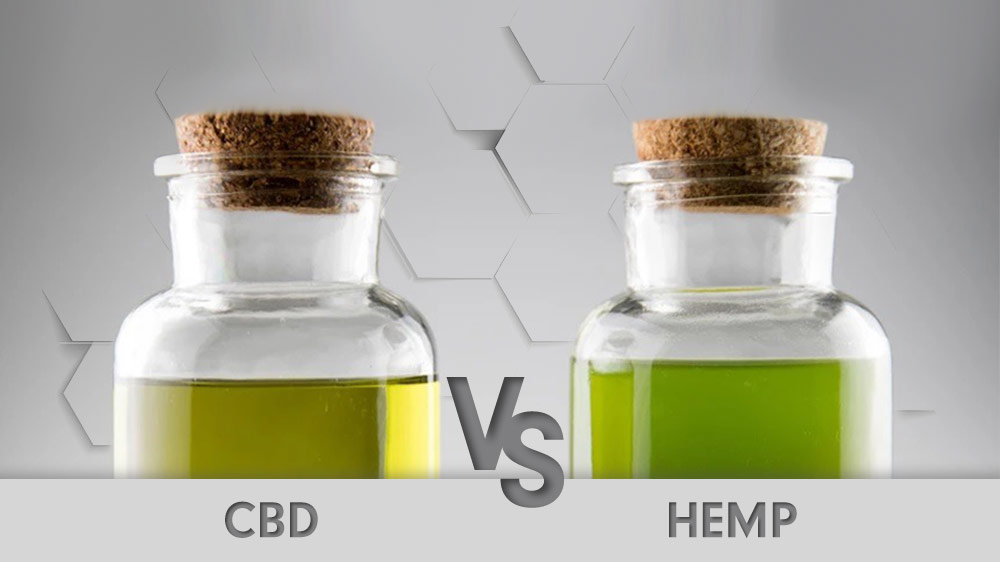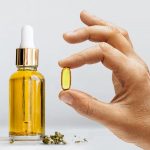The terms “hemp oil” and “CBD oil” can be seen on many products on the market these days. These buzz words are used to promote products that are advertised as natural options for treating various medical conditions or maintaining the overall health of the body.
Although both of these types of oil are very beneficial for the body, which we’ll talk about some more later in the text, they are not the same thing.
When these two terms are used interchangeably, consumers get confused and often end up buying a product that will not provide them with the effects they want.
Since these oils don’t have the same structure, they don’t have the same uses and they don’t offer the same benefits.
To avoid confusion and help you with your future purchases, let’s clarify both terms and the crucial differences between these oils.
Hemp Oil and Its Uses
Hemp oil is extracted from the plant called hemp. This plant has very low levels of the psychoactive compound tetrahydrocannabinol or THC (0.3% and lower) and high levels of cannabidiol or CBD.
When it comes to oils derived from hemp, there is a difference between hemp oil and hemp seed oil, although many producers use the term ‘hemp oil’ to describe oil that comes from the seeds of the hemp plant.
If we want to be precise, hemp oil is extracted from the aerial parts of the plant, usually stalks, while hemp seed oil is made only from the seeds of the hemp plant.
Since seeds don’t contain any CBD or other cannabinoids, you won’t find those compounds in hemp seed oil either. To make it more clear: if the oil is extracted from hemp seed, it will have no CBD, but the oil extracted from some other part of the plant can have varying levels of CBD.
Therefore, if you’re looking for CBD-rich oil, it is very important to read the labels on the product.
Since hemp seed oil is used as part of many different products, we will elaborate more on the uses and properties of this type of oil.
Properties
Hemp seed oil is derived in the process of cold pressing hemp seeds form industrial hemp.
Even though seeds don’t contain CBD, they have many other health benefits that don’t come from cannabidiol.
For example, hemp is a great source of omega 3 and omega 6 fatty acids, various amino acids and other important nutrients. So incorporating this oil in your daily diet can be nothing less than a smart decision.
While omega 6 acids are great for keeping your heart healthy and strong (1), omega 3 can help with lowering inflammation and easing symptoms of anxiety (2). Combined, these acids make a strong team for combating symptoms of atopic dermatitis (3).
These healthy fatty acids are not the only beneficial ingredients in hemp seed oil. The oil is also rich in vitamin C, E, D, magnesium, and calcium. That’s why many consumers who want to have an additional source of these important vitamins and minerals choose to buy hemp seed oil.
People who want to buy hemp seed oil should look for cold-pressed oil extracted from the seeds of the hemp plant that was organically grown. That means that hemp and the ground where the plant was growing weren’t treated with any synthetic pesticides or other harsh chemicals that can affect the quality of the oil from the plant’s seeds.
Uses
Hemp seed oil is usually used as a healthy addition to meals and drinks. Plus, it acts as a good moisturizer because it offers deep hydration for very dry skin and hair without clogging pores.
It’s no wonder it is used as an ingredient in many beauty and body care products, such as lotions, cremes, soaps, and shampoos.
Hemp seed oil can be used in many different ways. It can be consumed raw, right from the bottle, or in the form of tinctures and capsules.
It is often used as a base for making CBD oil tinctures. Because of its good properties, manufacturers use hemp seed oil instead of some castor oils (olive oil or coconut oil) to mix it with CBD extract and make CBD oil. That’s one more reason why these two oils are easily mistaken.
To clear up the confusion, below we will explain the properties of CBD oil and point out how it differs from hemp seed oil.
CBD Oil and Its Uses
CBD oil is a liquid product with a high amount of cannabidiol (CBD). It can be extracted both from marijuana and the hemp plant.
Since CBD oil manufacturers usually want to get oil that has minimal or no amount of THC, and growing marijuana is illegal in many countries, producers often choose to use hemp to extract cannabidiol rich oil.
So, since CBD oil has no or very low levels of THC, it doesn’t have a psychoactive effect on the user.
Unlike hemp seed oil, CBD oil is extracted from flowers, stems, and stalks of the hemp plant.
Those aerial parts of the plant are rich in cannabidiol.
Besides cannabidiol, CBD oil can have other compounds, and the amount of these other ingredients depends on the particular plant that is used for extraction and the type of extract that is used for the oil.
If the CBD oil is made from full-spectrum CBD extract, that means that besides cannabidiol, the oil will also contain other cannabinoids and terpenes.
On the other hand, if the oil is made with a CBD isolate, cannabidiol will be the only active compound in it. Also, the amount of cannabidiol can vary between different hemp plants. In other words, different CBD oils can have different concentrations of cannabidiol.
When it comes to using CBD oil, the ways to consume it are numerous.
The same as hemp seed oil, it can be found in the form of capsules, tinctures, and topicals.
CBD oil can also be vaped when it is made in the form of an e-juice.
Although CBD oil and hemp seed oil can have the same form, they affect the body in different ways, and consumers are using them for treating different health conditions.
CBD interacts with ECS, the endocannabinoid system, that regulates many bodily functions (e.g sleep, memory, appetite, mood). That’s the main reason why consuming CBD can have a positive effect on easing the symptoms of many different disorders and diseases (epilepsy (4), anxiety (5), multiple sclerosis(6), chronic pain (7), and acne (8)).
For decades, the consumption of CBD has been illegal, so its full health potential remains to be seen; now that the stigma about CBD use is broken, the number of clinical research studies will be on the rise.
The Bottom Line
There are three main differences between hemp seed oil and CBD oil: the source from which they are extracted, their content, and their uses.
Both of these oils have impressive benefits, and the choice which one to buy depends on the main reason for using it.
With both oils we advise that you smartly choose your manufacturer, read labels carefully, and follow recommendations regarding their dosage.
References:
- Delfin R.L, Grant N.P; The cardiac and haemostatic effects of dietary hempseed; Nutrition & Metabolism Journal; 2010; 7: 32.
- Janice K. K., Martha A. B, Rebecca A, William B. M, Ronald G; Omega-3 Supplementation Lowers Inflammation and Anxiety in Medical Students: A Randomized Controlled Trial; Brain, Behavior, and Immunity Journal; 2011;25 (8):1725-1734.
- Callaway J, Schwab U, Harvima I, Halonen P, Mykkänen O, Hyvönen P, Järvinen T; Efficacy of dietary hempseed oil in patients with atopic dermatitis;Journal of Dermatological Treatment; 2005;16(2):87-94
- Orrin D, J. Helen C, Linda L, Eric M, Ian M, Rima N, Ingrid E.S, Elizabeth A.T, Stephen W; Trial of Cannabidiol for Drug-Resistant Seizures in the Dravet Syndrome; The New England Journal of Medicine; 2017; 376:2011-2020.
- Crippa JA, Derenusson GN, Ferrari TB, Wichert-Ana L, Duran FL, Martin-Santos R, Simões MV, Bhattacharyya S, Fusar-Poli P, Atakan Z, Santos Filho A, Freitas-Ferrari MC, McGuire PK, Zuardi AW, Busatto GF, Hallak JE; Neural basis of anxiolytic effects of cannabidiol (CBD) in generalized social anxiety disorder: a preliminary report;The Journal of Psychopharmacology; 2011; 25(1):121-30.
- Mecha M, Feliú A, Iñigo PM, Mestre L, Carrillo-Salinas FJ, Guaza C; Cannabidiol provides long-lasting protection against the deleterious effects of inflammation in a viral model of multiple sclerosis: a role for A2A receptors; Neurobiology of disease; 2013; 59:141-50.
- Xiong W1, Cui T, Cheng K, Yang F, Chen SR, Willenbring D, Guan Y, Pan HL, Ren K, Xu Y, Zhang L; Cannabinoids suppress inflammatory and neuropathic pain by targeting α3 glycine receptors; The Journal of experimental medicine; 2012; 209(6):1121-34.
- Oláh A, Tóth BI, Borbíró I, Sugawara K, Szöllõsi AG, Czifra G, Pál B, Ambrus L, Kloepper J, Camera E, Ludovici M, Picardo M, Voets T, Zouboulis CC, Paus R, Bíró T; Cannabidiol exerts sebostatic and antiinflammatory effects on human sebocytes; Journal of Clinical Investigation; 2014 ;124(9):3713-24.








